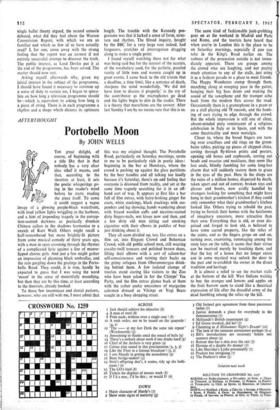Portobello Moon
AFTERTHOUGHT
By JOHN WELLS
Tim great delight, of course, of beginning with a title like that is that nobody, has a very clear idea what it means, and that, according to the theorists at least, it sets the poetic whisperings go- ing in the reader's mind before he starts reading the piece itself. To some it could suggest a vague image of a glowing purple-black waterfront, with loud yellow lights wriggling in the harbour, and a hint of impending tragedy in the corrup- tion-scented darkness as poetically drunken Chinese sailors in the shadows harmonise to a snatch of Kurt Weill. Others might recall a half-remembered but more brightly-lit picture from some musical comedy of thirty years ago, with a man in spats crooning through the rhymes of a complicated lyric against a line of mauve- lipped chorus girls. And just a few might gather an impression of gleaming black umbrellas, and the rain gurgling down the gratings in the Porto- bello Road. They could, it is true, hardly be expected to guess that I was using the word 'moon' in the sense of mournfully mooching, but then they are by this time, at least according to the theorists, already hooked.
To those few insomniacs and dental patients, however, who are still with me, I must admit that this was my original thought. The Portobello Road, particularly on Saturday mornings, seems to me to be particularly rich in poetic ideas: beginning in the bar at Henekeys, where the crowd is pushing up against the glass partitions by the beer handles and all talking too loudly because it's Saturday, there's on odd feeling that everyone is divorced'from reality, and yet at the same time vaguely searching for it in an off- hand sort of way. It appears at first like a bar full of film extras, with hairy-looking ginger fur coats, white stockings, black stockings with sus- penders and leg showing, hands wandering about with frayed woollen cuffs and nicotine-stained dirty fingers-nails, wet kisses now and then, and a few dirty old men sitting and smoking cigarettes with their elbows in puddles of beer just thinking about it.
They all seem divided up, too, like extras on a film set, into Elegant Crowd and Bohemian Crowd, with old public school men, still wearing cavalry-twill trousers and polished brown shoes, lifting their elbows with a sort of saloon-bar self-consciousness and turning their backs on the grimy refugees from Oberammergau drink- ing behind them. A few isolated clumps of tourists stand staring like visitors to the Zoo who have been asked in for the Chimps' Tea Party, and the film extras glance back at them with the rather cocky uneasiness of margarine salesmen dressed as Vikings or Yogi Bears caught in a busy shopping street.
The same kind of fashionable junk-grubbing goes on at the weekend in Madrid and Paris and Rome, and the tourists have heard that when you're in London this is the place to be on Saturday mornings, especially if you can take in the King's Road earlier on. The sadness of the procession outside is not imme- diately apparent. There are groups among the crowd who are laughing, and not paying much attention to any of the stalls, just using it as a fashion parade or a place to meet friends. The Happy Wanderers stump through them, marching along at creeping pace in the gutter, banging their big bass drum and making the sound of the saxophone and the trumpet echo back from the modern flats across the road. Occasionally there is a gramophone in a pram or on a stall playing old 78 records, and the honk- ing of cars trying to edge through the crowd. But the whole impression is still one of silent, absent-minded piety reminiscent of a religious celebration in Italy or in Spain, and with the same theatricality and mute nostalgia.
Closer to, where the bored fingers are turn- ing over crucifixes and old rings on the green- baize tables, picking up pieces of chipped china, sorting through fly-blown prints and posters, opening old boxes and cupboards, sorting out beads and rosaries and necklaces, they seem like lost souls, blindly fumbling for some long-lost charm that will suddenly restore them to grace in the eyes of the past. Here ih the shops are the ruins of a million homes, dispersed by death, taken apart and out of context, broken toys and glasses and books, now avidly handled by strangers looking for something that might have hung in their grandmother's kitchen if they could only remember what their grandmother's kitchen looked like. Others trying to rebuild the past, trying to furnish their homes with the heirlooms of imaginary ancestors, more attractive than their own. Everything that is old, or even dis- guised and forged to look old, is believed to have some sacred property, like the relics of the saints, and as the fingers grope on and on, turning over, examining, rummaging among the rusty keys on the table, it seems that their virtue can be received merely by touching them, and that the key of a house that no longer exists can in some mystical way unlock the door to the past and re-establish the owner in the direct tradition and heritage.
It is almost a relief to see the market stalls at the bottom of the hill. West Indians waiting to buy the oranges and lemons and apples on the fruit barrow seem to stand like a theatrical expression of life after the dreadful army of the dead fumbling among the relics up the hill.






























 Previous page
Previous page